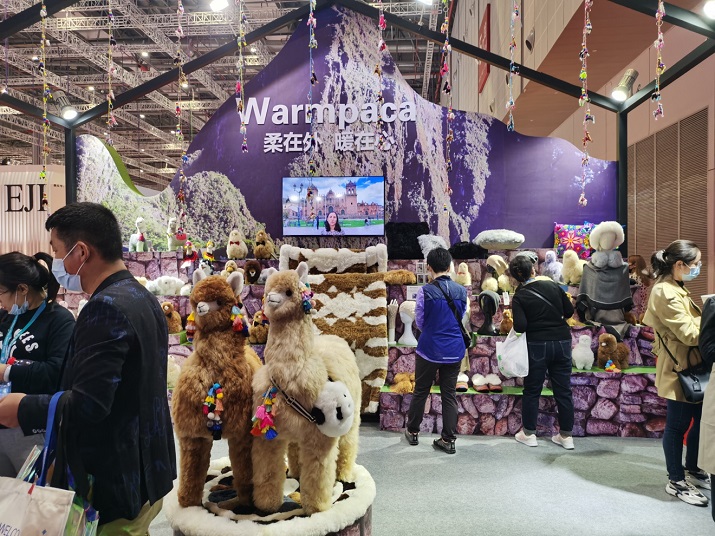Alpaca fur connects the Chinese market with Peruvian craftsmen
- By Li Xiaoyang
 0 Comment(s)
0 Comment(s) Print
Print E-mail Beijing Review, November 9, 2021
E-mail Beijing Review, November 9, 2021

As Chinese consumers embrace cute dolls and warm clothing made from Peruvian alpaca fur, Uncle Mamani, a Peruvian craftsman, has also embarked on a journey for the better. He and his family work for Warmpaca, a Peru-based brand set up by Chinese and Peruvian co-founders manufacturing alpaca fur products. This year marks the company's fourth time participating in the China International Import Expo (CIIE), once again proving an expo highlight.
Peru is home to the alpaca, a domesticated camelid mammal that roams the high altitudes of the Andes and bears soft and light fur which, after processing, can be used to generate a variety of products. Many Peruvian families rely on the raising of alpacas or selling of alpaca souvenirs for a living. The products of Warmpaca range from dolls to clothes and scarves. Established in 2018, the company has developed around 200 types of products. It has seen the floor area of its stand at the expo expand from only 9 square meters to some 30 square meters this year.
"Since China has been witnessing consistent economic recovery from the impact of the COVID-19 epidemic, the resumption of the Chinese market demand has driven the economic recovery of Peru," Ma Yuxia, one of the co-founders, told Beijing Review.
According to Ma, the company has gathered self-employed craftsmen in Peru for cooperative production. In the past, the craftsmen mostly sold alpaca fur products at fairs and their income was unstable. Today, Warmpaca supports them by helping to improve the quality and design of their handcrafted products, and connect them with the Chinese market, in turn enhancing their profits.
With an office in Shanghai, Warmpaca has developed many collaborative stores across China. It has also established online stores on e-commerce platforms such as Taobao and JD.com. Although sales volume is not huge, actual sales in the first five months of this year have seen fast growth, already exceeding 2020's total.
As Ma introduced, the prices of Warmpaca's products range from 100 yuan ($15.6) to more than 600 yuan ($93.7) as alpacas have a slow breeding rate and final products are made using the fur of alpacas that have died of natural causes. Moreover, the goods are handmade by Peruvian craftsmen inside their household workshops. The time and skill required for their completion make them highly valuable.
To boost trade and exchange, Peruvian trade promotion associations have provided training for the local staff of Warmpaca focusing on doing business with China, said Ma. "Last year, the epidemic rendered some Peruvians unemployed. Since China's orders have resumed this year, the income of the Peruvian craftsmen has again seen increase."





